-
RESEARCH01-01-2018
Effects of health education in the elderly with mild cognitive impairment
Revista Brasileira de Enfermagem. 2018;71:801-810
Abstract
RESEARCHEffects of health education in the elderly with mild cognitive impairment
Revista Brasileira de Enfermagem. 2018;71:801-810
DOI 10.1590/0034-7167-2017-0032
Views0See moreABSTRACT
Objective:
to analyze the effects of health education on both cognition and depressive/anxiety symptoms in the elderly with Mild Cognitive Impairment (MCI).
Method:
this is a randomized and controlled clinical trial. Participants (n=22) were recruited from a specialized outpatient clinic, and assigned into two groups: a Health Education Group (HEG) (n=10) and a Control Group (CG) (n=12). The participants were evaluated before and after the intervention, which was composed of classes and dynamics. The intervention consisted of 20 meetings, over a period of five months. The assessment was performed by means of the Addenbrooke’s Cognitive Examination – Revised (ACER), the Mini-Mental State Examination to access participant’s cognitive state, and the Beck’s Scale to access depressive/anxiety symptoms. A Memory Complaints Scale (EQM) was also used. The analysis was carried out using the Student’s t test for paired samples.
Results:
the HEG group demonstrated an improvement in attention/orientation (p= 0,026), memory (p=0.001), language (p= 0.033), and ACE-R (p= 0.003). On the other hand, the CG did not present improvement.
Conclusion:
the results highlight the importance of non-pharmacological interventions in older adults with MCI to reduce cognitive deficits.
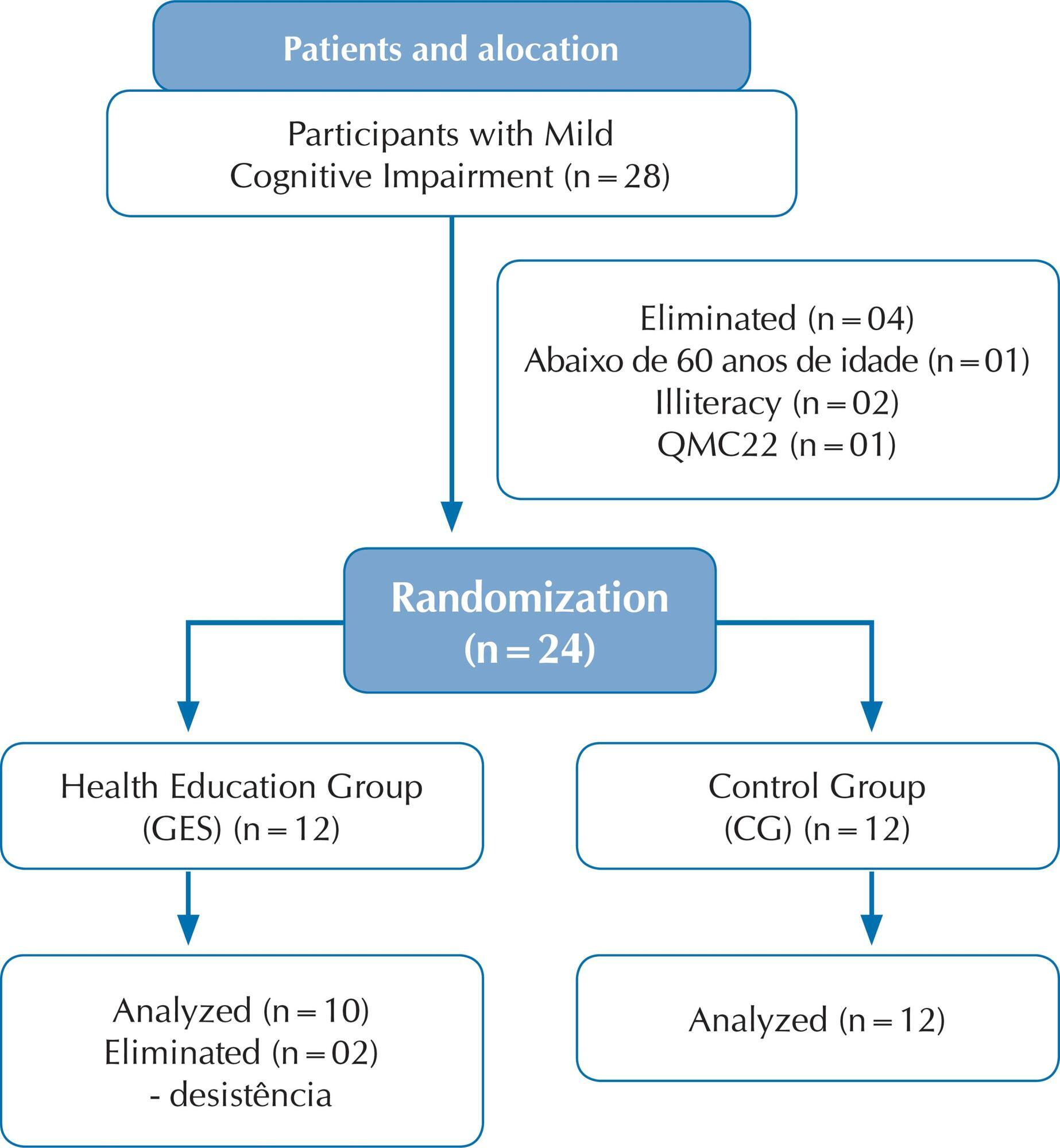
-
RESEARCH01-01-2018
Self-care of elderly people after the diagnosis of acquired immunodeficiency syndrome
Revista Brasileira de Enfermagem. 2018;71:793-800
Abstract
RESEARCHSelf-care of elderly people after the diagnosis of acquired immunodeficiency syndrome
Revista Brasileira de Enfermagem. 2018;71:793-800
DOI 10.1590/0034-7167-2017-0248
Views0See moreABSTRACT
Objective:
to characterize the seropositive elderly for the Human Immunodeficiency Virus and Acquired Immunodeficiency Syndrome (HIV/AIDS) in their socio-demographic aspects; to understand how the elderly take care of themselves from the diagnosis of HIV/AIDS.
Method:
Qualitative, descriptive, exploratory research conducted at a Voluntary Counseling and Testing Center with 10 elderly people receiving treatment for HIV/AIDS. The data were analyzed according to the content analysis.
Results:
Data show the elderly people’s lack of knowledge about HIV/AIDS transmission, the experience of being elderly and having HIV/AIDS, caring for oneself and life after diagnosis of HIV/AIDS in their daily lives.
Final considerations:
The diagnosis of HIV/AIDS seropositivity in the elderly generates a blend of feelings and fears that lead to food changes, adherence to treatment and the renunciation of daily and social habits, manifested as ways of self-care.
-
RESEARCH01-01-2018
Educational technology: a facilitating instrument for the elderly care
Revista Brasileira de Enfermagem. 2018;71:786-792
Abstract
RESEARCHEducational technology: a facilitating instrument for the elderly care
Revista Brasileira de Enfermagem. 2018;71:786-792
DOI 10.1590/0034-7167-2017-0129
Views0See moreABSTRACT
Objective:
To develop educational technology with caregivers of older people based on the needs, difficulties and concerns related to the elderly care expressed by the caregivers themselves.
Method:
Research of qualitative nature, with participant observation, based on concepts used by Paulo Freire. Data collection and analysis used the “World Cafe” methodology and the thematic content analysis, respectively.
Result:
The needs of these caregivers refer to their training and information on aging. The difficulties highlighted are deterrents to quality assistance to older adults, such as: insufficient resources, environmental factor and relationship with the family. The interests are evident in relation to the care and to its more subjective relationship.
Final considerations:
Educational technologies, printed matter and media, developed along with the caregivers, contribute to orientation and information of caregiver, population and professionals as facilitating instruments, regarding elderly care.
-
RESEARCH01-01-2018
Violence against the Brazilian elderlies: an analysis of hospitalizations
Revista Brasileira de Enfermagem. 2018;71:777-785
Abstract
RESEARCHViolence against the Brazilian elderlies: an analysis of hospitalizations
Revista Brasileira de Enfermagem. 2018;71:777-785
DOI 10.1590/0034-7167-2017-0139
Views0See moreABSTRACT
Objective:
to identify the prevalence of physical aggression and neglect and abandonment in the hospitalizations of Brazilian elderly people for violence and assault from 2008 to 2013 and the association of these causes with socio-demographic variables related to hospitalization.
Method:
quantitative, descriptive, cross-sectional study with elderlies hospitalized for assault. Inclusion criteria: to be 60 years old or over, to have been hospitalized in the Unified Health System (SUS) for assault or neglect and abandonment, between 2008 and 2013. The data were collected in February 2016, in Datasus database and descriptive and inferentially, using the Chi-square distribution, in the Epi Info 3.5.4 program.
Results:
the prevalence of hospitalizations due to assaults and violence prevailed among 60 and 69 years old men in the public sector. For abandonment and neglect, there was a higher prevalence in women, over 80 years old, in the public sector.
Conclusion:
nurses must be able to identify and prevent violence against the elderly.
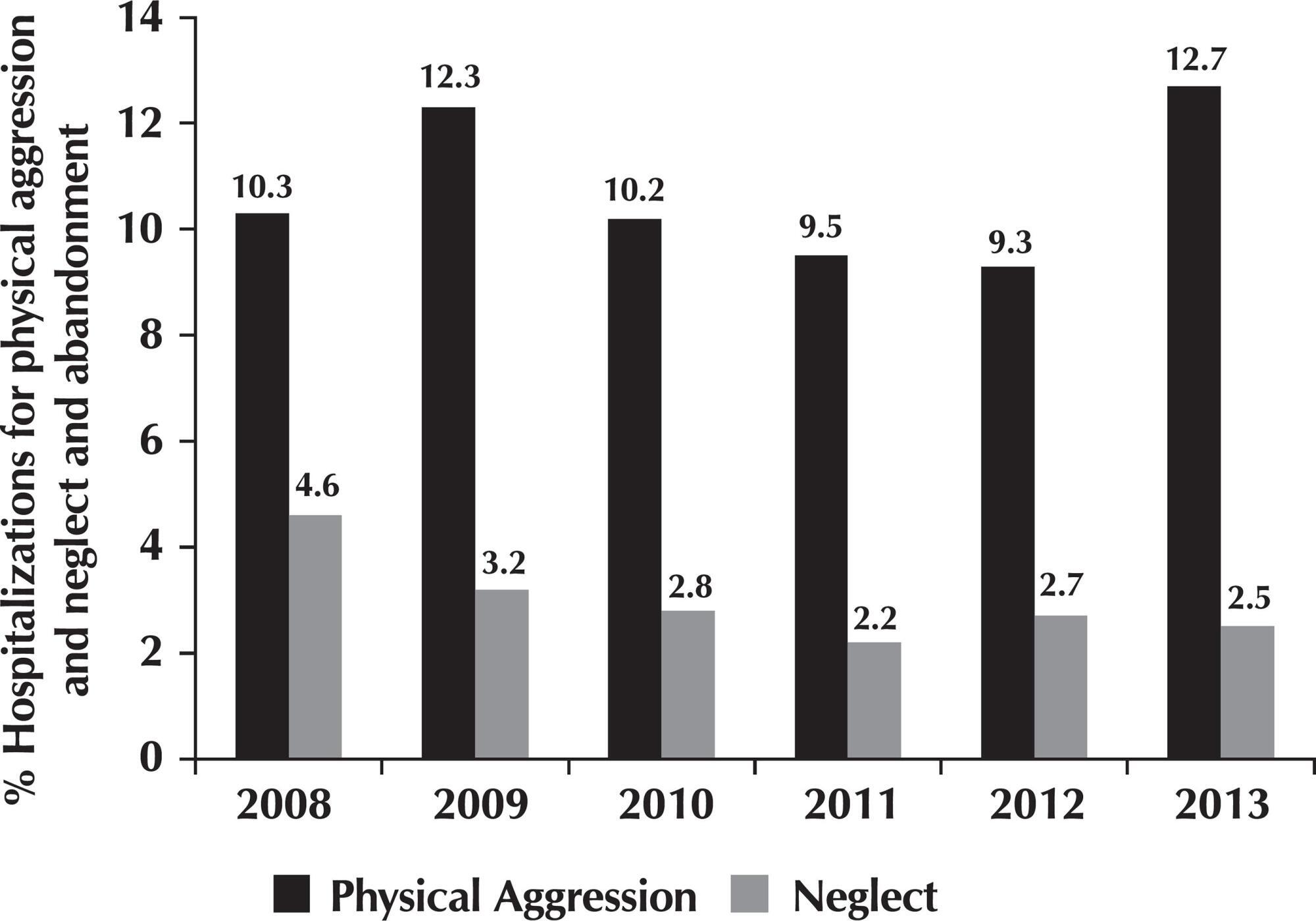
-
RESEARCH01-01-2018
The meaning of religion/religiosity for the elderly
Revista Brasileira de Enfermagem. 2018;71:770-776
Abstract
RESEARCHThe meaning of religion/religiosity for the elderly
Revista Brasileira de Enfermagem. 2018;71:770-776
DOI 10.1590/0034-7167-2017-0120
Views0See moreABSTRACT
Objective:
To understand the meaning of religion/religiosity for the elderly.
Method:
A qualitative, phenomenological study, based on Martin Heidegger. Thirteen older women registered in an Urban Social Center of Salvador, Bahia, Brazil aged between 60 and 84 years participated in the study. The collection of testimonies was carried out from November 2013 to May 2014 through phenomenological interviews.
Results:
Hermeneutics has unveiled the unit of meaning: Meanings of religion/religiosity in the daily life of the elderly. Religion/religiosity offers comfort and well-being to the elderly person, helping to overcome changes arising from the aging process.
Final considerations:
The nurse, while providing care, should expand his/her vision in relation to the subjectivity of the elderly, in order to understand that religion/religiosity gives meaning to their existence.
-
RESEARCH01-01-2018
Repercussions of hospitalization due to fall of the elderly: health care and prevention
Revista Brasileira de Enfermagem. 2018;71:763-769
Abstract
RESEARCHRepercussions of hospitalization due to fall of the elderly: health care and prevention
Revista Brasileira de Enfermagem. 2018;71:763-769
DOI 10.1590/0034-7167-2017-0069
Views0See moreABSTRACT
Objective:
To know the repercussions of the fall reported by the elderly and their caregiver during hospitalization in a public hospital in Florianópolis city from October to December 2014.
Method:
Exploratory research with a qualitative approach, conducted by depth interviews with 16 participants, the eight elderly were hospitalized for falls and eight elderly caregivers. Data analysis were performed through the Thematic Content Analysis.
Results:
It was evidenced the thematic axis: Faller Elderly supported by four thematic categories: Changes caused by Falls, I am a faller, I take care of me and Prevention of the Fall. The repercussions of the fall were evidenced in the impairment of the health condition, self-care and functional capacity. We observed the naturalization of the phenomenon and the passivity with the harmful consequences of the event.
Final Considerations:
The fall is valued the more negative its repercussion, such as the need for hospitalization and surgery. Managing the vulnerability of the elderly, especially in primary care, evaluating their comorbidities and their internal and external environment, will minimize unfavorable consequences and the social and financial cost of hospitalizations.
-
RESEARCH01-01-2018
Suicidal ideation and attempt of older women in Northeastern Brazil
Revista Brasileira de Enfermagem. 2018;71:755-762
Abstract
RESEARCHSuicidal ideation and attempt of older women in Northeastern Brazil
Revista Brasileira de Enfermagem. 2018;71:755-762
DOI 10.1590/0034-7167-2017-0413
Views0See moreABSTRACT
Objective:
to associate the life experiences of older women from the Northeast of Brazil with their suicidal ideation and attempts.
Method:
Qualitative study with fourteen older adults from Piripiri (PI), Teresina (PI), Fortaleza (CE) and Recife (PE) who were interviewed between November 2013 and July 2014. The organization of data originated the themes: experiences of abuse throughout their lives; marital fractures and social isolation; weakened motherhood.
Results:
The women were born and lived most of their life in the countryside, amid poverty and social exclusion. They had a history of abuse, physical and sexual violence, perpetrated by intimate partners and/or family members. They experienced social isolation, weakened emotional bonds and several suicide attempts.
Final considerations:
The life of these older women was affected by traumatic events that enhanced feelings of hopelessness, depressive symptoms and the absence of a plan for the future, making them consider suicide as a way to anticipate death.
-
RESEARCH01-01-2018
Validation of the Falls Efficacy Scale – International in a sample of Portuguese elderly
Revista Brasileira de Enfermagem. 2018;71:747-754
Abstract
RESEARCHValidation of the Falls Efficacy Scale – International in a sample of Portuguese elderly
Revista Brasileira de Enfermagem. 2018;71:747-754
DOI 10.1590/0034-7167-2017-0497
Views0See moreABSTRACT
Objective:
to translate and adapt Falls Efficacy Scale – International (FES-I). To analyze the psychometric properties of the FES-I Portugal version.
Method:
psychometric study. Sample consisting of 170 elderly people residing in the Autonomous Region of Madeira. A two- part form was used (sociodemographic characterization and FES-I Portugal). The cross-cultural adaptation was performed and the following psychometric properties were evaluated: validity (construct, predictive, and discriminant), reliability (Cronbach’s alpha), and inter-rater reliability.
Results:
the results allow us to verify a dimension of less demanding physical activities and another of more demanding physical activities. The inter-rater reliability study was 0.62, with an interclass correlation coefficient of 0.859, for a 95% confidence interval. The internal consistency of the Portuguese version was 0.962.
Conclusion:
the validity and reliability of the FES-I Portugal are consistent with the original version and proved to be appropriate instruments for evaluating the “impaired walking” and “risk of falls” nursing diagnoses in the older people.
-
RESEARCH01-01-2018
Assistance flowchart for pain management in a Neonatal Intensive Care Unit
Revista Brasileira de Enfermagem. 2018;71:1281-1289
Abstract
RESEARCHAssistance flowchart for pain management in a Neonatal Intensive Care Unit
Revista Brasileira de Enfermagem. 2018;71:1281-1289
DOI 10.1590/0034-7167-2017-0265
Views0See moreABSTRACT
Objective:
To describe and discuss the process of developing a flowchart collectively constructed by the health team of a Neonatal Intensive Care Unit for the management of neonatal pain.
Method:
This is a descriptive and an exploratory study with a qualitative approach that used Problem-Based Learning as a theoretical-methodological framework in the process of developing the assistance flowchart for the management of neonatal pain.
Results:
Based on this methodology, there was training in service and the discussion of key points of pain management by the health team, which served as input for the construction of the flowchart.
Final considerations:
The assistance flowchart for pain management, based on scientific evidence, provided means to facilitate the decision-making of the health team regarding the pain of the newborn. It is suggested to use the flowchart frequently to promote the permanent education of the team and identify possible points to be adjusted.

-
RESEARCH01-01-2018
The adolescent and the institutionalization: understanding the phenomenon and meanings attributed to it
Revista Brasileira de Enfermagem. 2018;71:1373-1380
Abstract
RESEARCHThe adolescent and the institutionalization: understanding the phenomenon and meanings attributed to it
Revista Brasileira de Enfermagem. 2018;71:1373-1380
DOI 10.1590/0034-7167-2017-0242
Views1See moreABSTRACT
Objective:
To understand the meaning of being institutionalized and in conflict with the law for the institutionalized adolescent.
Method:
A qualitative, phenomenological-comprehensive study carried out in a Socio-educational Service Foundation in the northern region of Brazil, with 05 institutionalized adolescents. The analysis was carried out under the understanding of the content suggested by Heidgger, thus allowing the construction of analytical categories for a hermeneutical interpretation.
Results:
Conflicting with the law means something negative and bad for the institutionalized adolescents, in which they understand that although there is deprivation of liberty, the period of hospitalization is an important moment for the reflection on the need to start over.
Conclusion:
The meaning of conflicting with the law goes far beyond a simple word, act or behaviour, it is something that only those who experience the phenomenon are able to unveil, arouse deep feelings and provide reflection to the adolescent about the damages caused by the infraction.
-
RESEARCH01-01-2018
Identification of post-cesarean surgical site infection: nursing consultation
Revista Brasileira de Enfermagem. 2018;71:1395-1403
Abstract
RESEARCHIdentification of post-cesarean surgical site infection: nursing consultation
Revista Brasileira de Enfermagem. 2018;71:1395-1403
DOI 10.1590/0034-7167-2017-0325
Views0See moreABSTRACT
Objective:
To describe the profile of women in relation to their living conditions, health status and socio-demographic profile, correlating it with the presence of signs and symptoms suggestive of post-cesarean surgical site infection, identifying information to be considered in the puerperium consultation performed by nurses and proposing a roadmap for the systematization of care.
Method:
Quantitative, exploratory, descriptive, cross-sectional and retrospective review of medical records of women who had cesarean deliveries in 2014, in the city of São Paulo.
Results:
89 medical records were analyzed, 62 of them with incomplete information. In 11, there was at least one of the signs and symptoms suggestive of infection.
Conclusion:
Given the results of the study, the systematization of puerperal consultation is essential. The roadmap is an instrument that can potentially improve the quality of service and the recording of information.
-
RESEARCH01-01-2018
Nursing laboratory and critical education of nurses: approaches and distances
Revista Brasileira de Enfermagem. 2018;71:1500-1506
Abstract
RESEARCHNursing laboratory and critical education of nurses: approaches and distances
Revista Brasileira de Enfermagem. 2018;71:1500-1506
DOI 10.1590/0034-7167-2017-0339
Views1See moreABSTRACT
Objective:
to analyze the contribution of the laboratory of nursing to the critical education of nurses.
Method:
qualitative study, conducted among 18 professors of higher education institutions, being one public and the other private. Data were collected between February and November of 2016 by means of semi-structured interview. To analyze data, it was used a content analysis in the thematic modality.
Results:
it was observed the emphasis in the technical skills development by propagation of behavior and practices; the creation of bonds between professors and students happens on the limit of good interpersonal relationship; the laboratory of nursing may help the critical reflection about the practice, being a place that allows the learning of ethics.
Final considerations:
the nurse education, carried out by the laboratory of nursing, have to overcome the emphasis in the uncritical reproduction of practices and to observe the nurse’s power to think about the reality in the meaning of its modification.
-
RESEARCH01-01-2018
Introduction of the School Health Program in the city of Cascavel, Paraná State: report of nurses
Revista Brasileira de Enfermagem. 2018;71:1540-1547
Abstract
RESEARCHIntroduction of the School Health Program in the city of Cascavel, Paraná State: report of nurses
Revista Brasileira de Enfermagem. 2018;71:1540-1547
DOI 10.1590/0034-7167-2017-0188
Views1See moreABSTRACT
Objective:
to understand the introduction of the School Health Program in the city of Cascavel, Paraná State, as opposed to the report of nurses.
Method:
a qualitative study with fifteen participants. The data were collected from April to August 2015, through semi-structured interviews, analyzed by content analysis and thematic modality.
Results:
the category “Introduction process” of the School Health Program integrates the subcategories “Identified health problems” and the “Challenges of intersectoriality”. The program was implemented quickly, with a fragile training of professionals to perform in the phases that compose it. Structural conditions of schools, human and material resources, and emerging intersectoral interaction were identified obstacles. The integration of the health, school, and family constitutes the program’s potentiality.
Final considerations:
it is understood that the actions of the program were based on health assessments of students, and it is necessary for professionals and managers to discuss and analyze the obstacles identified to achieve all the proposed objectives.
-
RESEARCH01-01-2018
Knowledge about precautions in Primary Health Care: tool validation
Revista Brasileira de Enfermagem. 2018;71:1589-1595
Abstract
RESEARCHKnowledge about precautions in Primary Health Care: tool validation
Revista Brasileira de Enfermagem. 2018;71:1589-1595
DOI 10.1590/0034-7167-2017-0886
Views0See moreABSTRACT
Objective:
To elaborate and validate a tool to assess knowledge and behavior of nursing professionals about standards and specific precautions in the Primary Health Care.
Method:
Methodological study of the elaboration and validation of the tool by thirteen experts judges, using a Likert scale of 4 points, with Content Validity Index ≥ 0.80, on clarity, relevance and pertinence.
Results:
A tool composed of 47 dichotomous questions to assess knowledge and 12 questions, with five options of answers, for the referred behavior. In the validation, only one item was deleted, related to the “Hands Hygiene” axis and one item was reformulated, regarding “Use of Common Gloves” and another 11 changed writing. The tool as a whole was assessed for relevance, comprehensiveness and representativeness within the scope of the topic investigated.
Conclusion:
The developed tool has been validated and is now available for use in Primary Health Care.
-
RESEARCH01-01-2018
Training in diabetes education: meanings attributed by primary care nurses
Revista Brasileira de Enfermagem. 2018;71:1611-1618
Abstract
RESEARCHTraining in diabetes education: meanings attributed by primary care nurses
Revista Brasileira de Enfermagem. 2018;71:1611-1618
DOI 10.1590/0034-7167-2017-0792
Views1See moreABSTRACT
Objective:
seize meanings attributed by primary care nurses to training in diabetes education.
Method:
exploratory and descriptive study, with a qualitative approach, with twenty primary care nurses; semistructured interview script, with interviews processed in the IRaMuTeQ software and analyzed through the Descending Hierarchical Classification. The results were subsidized in the Representational Theory of Meaning.
Results:
nurse training in diabetes education is insufficient for holistic action, although it allows the community to be instrumentalized in specific issues about the disease, using the limited tools available, especially lectures. Nurses find themselves in a context of challenges, improvisations, weaknesses, and limitations that determine the meaning attributed to diabetes education and subsequent actions.
Conclusion:
the meanings attributed by the nurses revealed an incipient training, which limits the quality of care provided and instigates the search for qualification.

-
RESEARCH01-01-2018
Nursing international student mobility in the University of São Paulo
Revista Brasileira de Enfermagem. 2018;71:1619-1625
Abstract
RESEARCHNursing international student mobility in the University of São Paulo
Revista Brasileira de Enfermagem. 2018;71:1619-1625
DOI 10.1590/0034-7167-2017-0754
Views1See moreABSTRACT
Objective:
To characterize the experiences of undergraduate students of the School of Nursing of the University of São Paulo (EEUSP) who participated in international mobility programs between January 2011 and July 2017.
Method:
Exploratory, descriptive study with quantitative approach. Of 68 reports, only 38 (56%) were considered valid and were submitted to descriptive statistical analysis. Data were categorized in general, institutional, academic and cultural aspects and cost of living.
Results:
The main destination was Portugal and the years with most participation were 2012 and 2013. The mean stay was six months and the students took a mean of three to four courses. The main funder was the university of origin.
Conclusion:
Academic activities were limited to theoretical and practical courses, with little insertion in research. There is a need to increase investment in learning other languages and to expand partnerships with larger centers of foreign education and research.
-
ORIGINAL ARTICLE06-16-2021
Patient participation in care safety: Primary Health Care professionals’ perception
Revista Brasileira de Enfermagem. 2021;74(2):e20200773
Abstract
ORIGINAL ARTICLEPatient participation in care safety: Primary Health Care professionals’ perception
Revista Brasileira de Enfermagem. 2021;74(2):e20200773
DOI 10.1590/0034-7167-2020-0773
Views0See moreABSTRACT
Objectives:
to analyze health professionals’ perception about the meaning and practice of patient involvement in care safety in Primary Health Care.
Methods:
this is an exploratory, qualitative study, developed with 22 professionals in the Federal District, Brazil. A semi-structured interview was conducted between October and November/2018. Content analysis was carried out according to Bardin.
Results:
nurses, physicians, dentists, among others, participated. The following categories emerged: Meaning of patient involvement in care safety; Factors intervening in patient involvement in care safety; Strategies for patient involvement in care safety; Qualification for patient involvement in care safety.
Final Considerations:
the meaning of patient involvement for care safety was associated with co-responsibility and patient-centered care. Professionals’ practice revealed intervening factors and the use of involvement strategies. A gap was identified in training on patient involvement in care safety.
-
REVIEW03-30-2020
Internet influence on the biopsychosocial health of adolescents: an integratitive review
Revista Brasileira de Enfermagem. 2020;73(2):e20180766
Abstract
REVIEWInternet influence on the biopsychosocial health of adolescents: an integratitive review
Revista Brasileira de Enfermagem. 2020;73(2):e20180766
DOI 10.1590/0034-7167-2018-0766
Views0See moreABSTRACT
Objectives:
To identify scientific evidence on the influence of internet use on adolescents’ biopsychosocial health.
Methods:
Integrative review, with database search, using the descriptors “internet”, “adolescent health” and “adolescent behavior”. After applying the inclusion and exclusion criteria, 16 articles were selected.
Results:
Knowledge convergence produced for three main themes was demonstrated: “Internet exposure time and possible damages to adolescent health”; “Internet, adolescent and cyberbullying”; and “Internet as a source of information for adolescent health”.
Final considerations:
The network involves an intricate network of interactions, providing varied behaviors and attitudes that reflect on adolescent health. Therefore, it is important to articulate nursing actions with the school community and the family, in order to carry out health education.
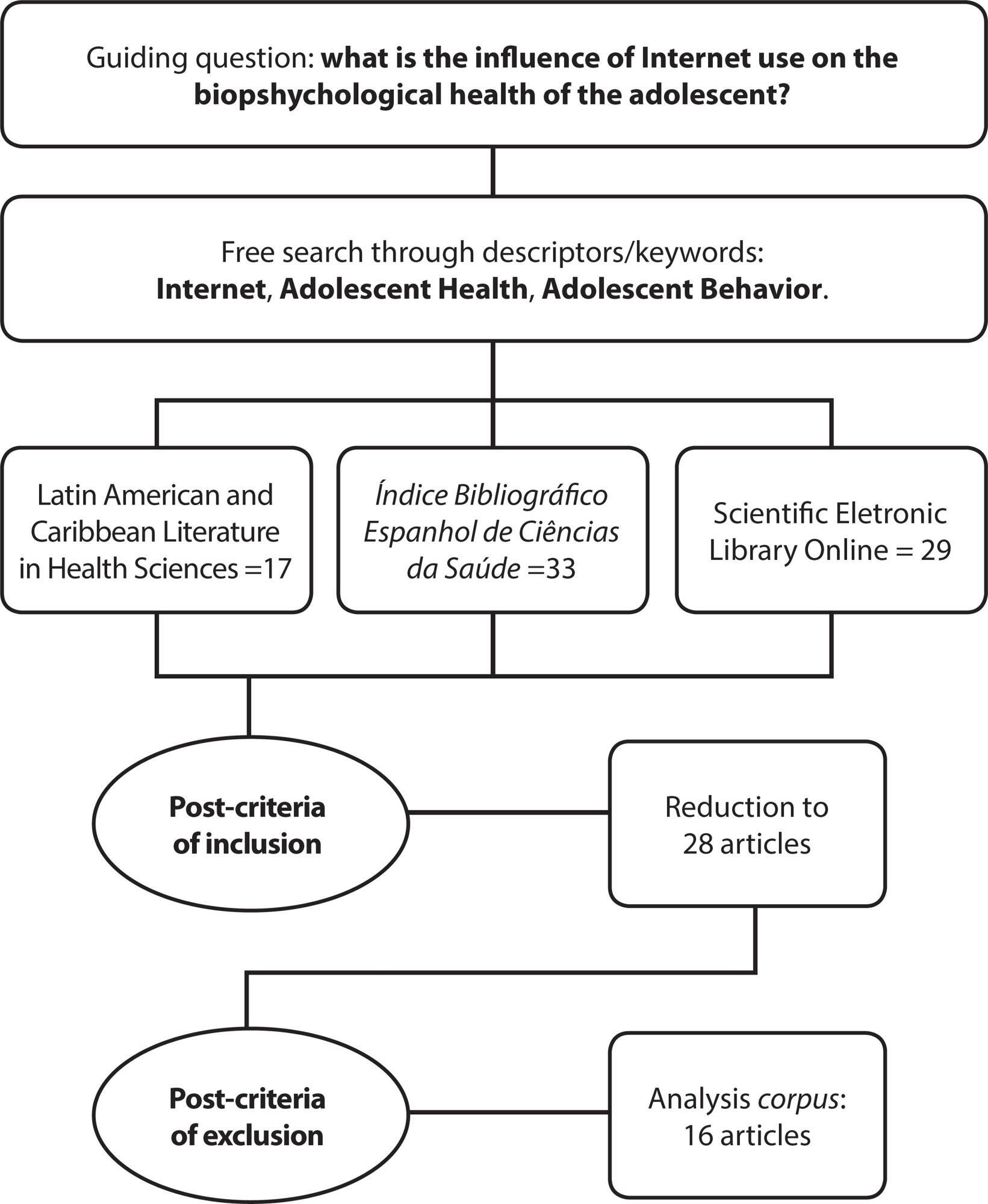
-
REFLECTION07-10-2020
Psychosocial risks and the health of health workers: reflections on Brazilian labor reform
Revista Brasileira de Enfermagem. 2020;73:e20190092
Abstract
REFLECTIONPsychosocial risks and the health of health workers: reflections on Brazilian labor reform
Revista Brasileira de Enfermagem. 2020;73:e20190092
DOI 10.1590/0034-7167-2019-0092
Views0See moreABSTRACT
Objective:
to reflect on the psychosocial risks and their impacts on the health of health workers in light of the Brazilian economic context and Labor Reform.
Method:
reflective study on the Brazilian Labor Reform and its impacts on health of health workers.
Results:
although the changes observed in the labor sphere have contributed to improvements in health and safety policies for, these changes have also contributed to the emergence of new risks arising from work activities, including psychosocial risks, which affect all occupational categories.
Final considerations:
we understand that the Brazilian Labor Reform carried out in 2017 leads to the weakening of labor relations, increases workers’ exposure to risks in the workplace, increases the risk of illness, and opposes the global movement of international organizations aimed at the prevention of aggravation in workers’ health and also at preserving their health.
-
REVIEW06-17-2020
The role of the nurse in caring for the critical patient with sepsis
Revista Brasileira de Enfermagem. 2020;73(4):e20190031
Abstract
REVIEWThe role of the nurse in caring for the critical patient with sepsis
Revista Brasileira de Enfermagem. 2020;73(4):e20190031
DOI 10.1590/0034-7167-2019-0031
Views0See moreABSTRACT
Objectives:
to know the nursing interventions in the identification, prevention and control of sepsis in critical patients.
Methods:
integrative review of the literature, with two parallel researches using different MesH terms, using the EBSCO database and Google Scholar. Nine studies were included in the sample.
Results:
nursing interventions are centered on the creation/implementation of protocols for the early recognition of sepsis, the training of teams to ensure a safe and effective approach and the adoption of measures for infection prevention and control as a way to prevent sepsis.
Final Considerations:
the evidence shows that nurses are fundamental in the early identification, control and prevention of sepsis, preventing disease progression and contributing to decreased morbidity and mortality.
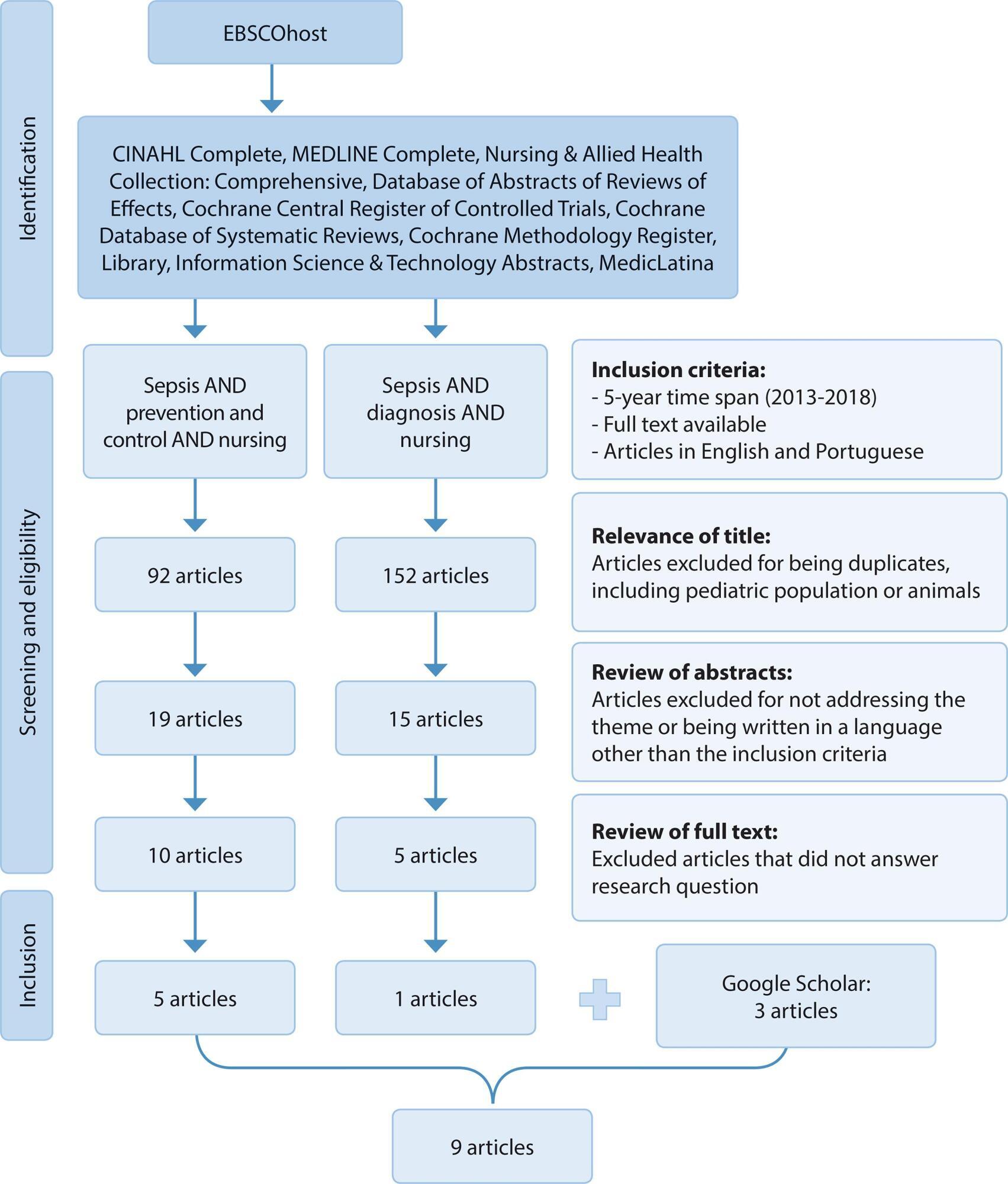
-
ORIGINAL ARTICLE05-15-2020
Configuration of power relations in physicians and nurses’ professional practices
Revista Brasileira de Enfermagem. 2020;73:e20180629
Abstract
ORIGINAL ARTICLEConfiguration of power relations in physicians and nurses’ professional practices
Revista Brasileira de Enfermagem. 2020;73:e20180629
DOI 10.1590/0034-7167-2018-0629
Views0See moreABSTRACT
Objective:
to analyze the configuration of power relations constituted in and by the knowledge and daily practices of physicians and nurses in an Intensive Care Unit (ICU).
Method:
qualitative study in which data were collected through interviews with physicians and nurses from an ICU of a hospital in Belo Horizonte, Minas Gerais. A semi-structured script was used. Data were analyzed through discourse analysis in a Foucaultian perspective.
Results:
three categories were developed – Professional Identity: self-recognition in the profession; Discipline: individualizing attitudes or collective need?; and Circularity of knowledge and power in the constitution of daily practices.
Final considerations:
the identity, discipline and circulation of power are connected in a continuous movement of subjectivation of the subject, which, in turn, uses discourse as a persuasion strategy to modify the position taken over in different situations thereby causing the circulation of power.
-
ORIGINAL ARTICLE02-10-2020
Theater of the Oppressed and bullying: nursing performance in school adolescent health
Revista Brasileira de Enfermagem. 2020;73(1):e20170910
Abstract
ORIGINAL ARTICLETheater of the Oppressed and bullying: nursing performance in school adolescent health
Revista Brasileira de Enfermagem. 2020;73(1):e20170910
DOI 10.1590/0034-7167-2017-0910
Views0See moreABSTRACT
Objective:
to assess the effects of an intervention based on the Theater of the Oppressed in reducing school bullying.
Method:
a quasi-experimental study with 232 first-year high school students from two public schools in the city of Cuiabá, Mato Grosso State, Brazil. An intervention was performed with the Theater of the Oppressed, a theatrical methodology created by Augusto Boal and inspired by Paulo Freire’s “Pedagogy of the Oppressed”, in which one school composed the intervention group, and another school, the comparison group. Both groups were assessed for involvement in bullying situations before and after intervention. For data analysis, Poisson Regression models with random effect were used.
Results:
intervention group presented a significant decrease in direct victimization (physical and verbal aggression).
Conclusion:
the Theater of the Oppressed represents an important strategy in reducing bullying victimization among school adolescents.
-
ORIGINAL ARTICLE02-10-2020
Common Mental Disorders and Contemporary Factors: 1982 Birth Cohort
Revista Brasileira de Enfermagem. 2020;73(1):e20180162
Abstract
ORIGINAL ARTICLECommon Mental Disorders and Contemporary Factors: 1982 Birth Cohort
Revista Brasileira de Enfermagem. 2020;73(1):e20180162
DOI 10.1590/0034-7167-2018-0162
Views0See moreABSTRACT
Objective:
To describe the association between common mental disorders and socio-demographic variables, smoking habits and stressful events among the 30-year-old members of a 1982 cohort.
Method:
Mental disorder was analyzed by the Self-Reporting Questionnaire (SRQ-20). Poisson regression was used to analyze the unadjusted and adjusted associations.
Results:
Low level of education and stressful events increased the prevalence of mental disorders for both genders. Lower income for women and unemployment for men also remained associated with CMD.
Conclusion:
It was possible to describe the association between contemporary factors and mental disorders in a young population, to which prevention and control measures, through public policies proposed to the areas of Primary Care, Mental Health and Education, can represent a better quality of life and health.
-
REVIEW12-21-2020
Lean Six Sigma methodology application in health care settings: an integrative review
Revista Brasileira de Enfermagem. 2020;73:e20190861
Abstract
REVIEWLean Six Sigma methodology application in health care settings: an integrative review
Revista Brasileira de Enfermagem. 2020;73:e20190861
DOI 10.1590/0034-7167-2019-0861
Views0See moreABSTRACT
Objective:
to analyze the scientific production on the results of Lean Six Sigma methodology in health care institutions.
Methods:
an integrative literature review, with the following question: what are the results in health institutions using Lean Six Sigma and Six Sigma methodology? The search was carried out at MEDLINE, LILACS, BDENF, CINAHL, Web of Science, and Scopus, with no time frame.
Results:
thirty-four articles were included, published between 2005 and 2019, of which 52.9% came from the United States of America. The most commonly found improvements were in hospital institutions and from the perspective of customers and internal processes.
Conclusion:
using Lean Six Sigma methodology proved to be effective in the different health care settings, evidencing a gap in its application regarding people engagement and training.
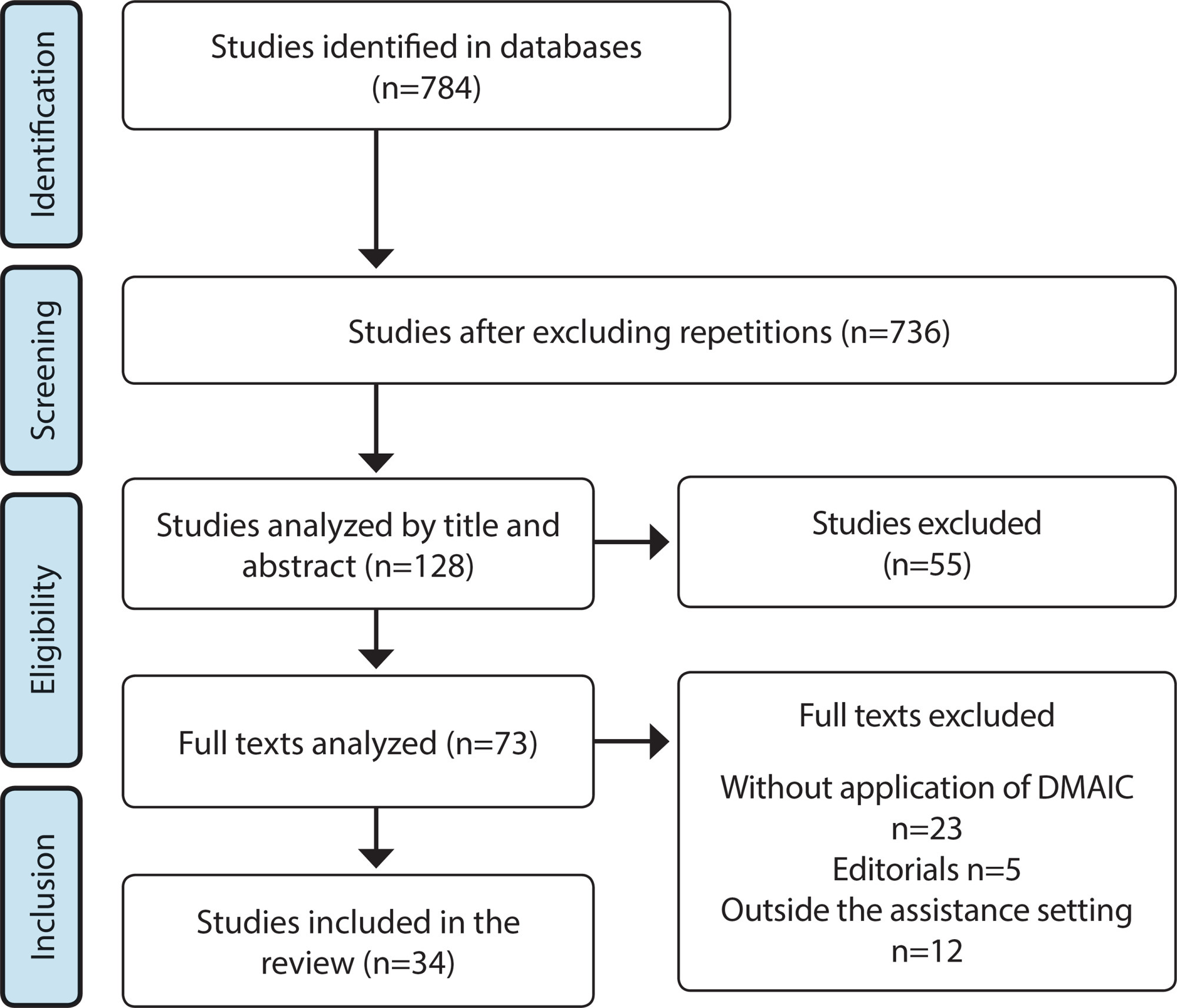
Search
Search in:
Nuvem de Tags
Adolescente (85) Atenção Primária à Saúde (239) COVID-19 (91) Criança (91) Cuidados de Enfermagem (269) Educação em Enfermagem (151) Educação em Saúde (139) Enfermagem (930) Enfermagem Pediátrica (86) Estudantes de Enfermagem (77) Estudos de Validação (131) Família (87) Idoso (208) Promoção da Saúde (99) Qualidade de Vida (104) Saúde do Trabalhador (86) Saúde Mental (145) Saúde Pública (82) Segurança do Paciente (150) Tecnologia Educacional (100)



